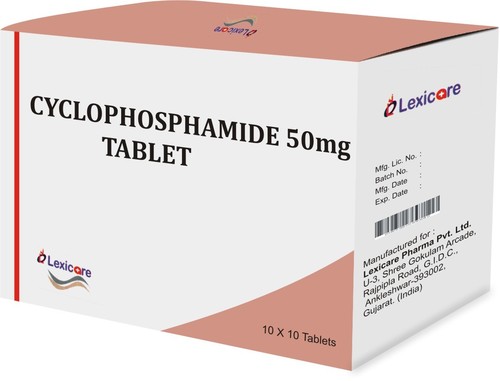Cyclophosphamide is a chemotherapy medication belonging to the alkylating agent class of drugs. It is used in the treatment of various types of cancer, including leukemia, lymphoma, multiple myeloma, breast cancer, ovarian cancer, and certain types of childhood cancers. Cyclophosphamide works by interfering with the DNA replication process in cancer cells, ultimately leading to their destruction. Cyclophosphamide Tablets Uses Benefits and Symptoms Side Effects

Cyclophosphamide Tablet Uses :
- Cancer Treatment: Cyclophosphamide is primarily used as a chemotherapy drug for the treatment of various cancers. It can be administered alone or in combination with other chemotherapy drugs, radiation therapy, or immunotherapy, depending on the specific type and stage of cancer.
- Autoimmune Diseases: In addition to its anticancer properties, cyclophosphamide is also used to treat certain autoimmune diseases, such as systemic lupus erythematosus (SLE), rheumatoid arthritis, and vasculitis. It helps suppress the abnormal immune response responsible for causing inflammation and tissue damage in these conditions.
- Bone Marrow Transplantation: Cyclophosphamide is sometimes used as part of conditioning regimens in bone marrow or stem cell transplantation procedures. It helps suppress the recipient’s immune system to prevent rejection of the transplanted cells and reduce the risk of graft-versus-host disease (GVHD).
Cyclophosphamide Tablet Benefits :
- Effective Cancer Treatment: Cyclophosphamide has demonstrated efficacy in the treatment of various cancers, both as a single agent and in combination with other chemotherapy drugs. It is particularly effective against certain types of leukemia, lymphoma, and solid tumors.
- Versatility: Cyclophosphamide is used to treat a wide range of cancers, making it a versatile chemotherapy drug. It can be administered orally or intravenously, allowing for flexibility in treatment regimens.
- Immunosuppressive Properties: In autoimmune diseases, cyclophosphamide’s immunosuppressive effects help alleviate symptoms and prevent disease progression by suppressing the abnormal immune response responsible for tissue damage.
- Pre-transplant Conditioning: In bone marrow or stem cell transplantation, cyclophosphamide plays a crucial role in conditioning regimens by suppressing the recipient’s immune system and creating a favorable environment for engraftment of donor cells.
Cyclophosphamide Tablet Side Effects :
- Bone Marrow Suppression: One of the most common side effects of cyclophosphamide is bone marrow suppression, which can lead to a decrease in white blood cells, red blood cells, and platelets. This may result in an increased risk of infections, anemia, and bleeding tendencies.
- Nausea and Vomiting: Cyclophosphamide can cause nausea and vomiting, which are common side effects of chemotherapy. Anti-nausea medications may be prescribed to help alleviate these symptoms.
- Hair Loss: Chemotherapy-induced hair loss, or alopecia, is another common side effect of cyclophosphamide treatment. Hair loss may occur gradually or abruptly and is usually reversible after treatment completion.
- Increased Risk of Infections: Due to its immunosuppressive effects, cyclophosphamide can increase the risk of infections, including bacterial, viral, and fungal infections. Patients receiving cyclophosphamide treatment should take precautions to avoid exposure to infectious agents and promptly report any signs of infection to their healthcare provider.
- Gastrointestinal Symptoms: In addition to nausea and vomiting, cyclophosphamide may cause other gastrointestinal symptoms such as diarrhea, constipation, and abdominal pain.
- Bladder Toxicity: Cyclophosphamide metabolites can accumulate in the bladder, leading to bladder irritation and inflammation. This may cause symptoms such as urinary urgency, frequency, dysuria (painful urination), and hematuria (blood in the urine). Hydration and administration of mesna, a bladder-protective agent, are often used to minimize bladder toxicity.
- Increased Risk of Secondary Cancers: Long-term use of cyclophosphamide may be associated with an increased risk of developing secondary cancers, such as bladder cancer and leukemia, particularly in patients who have received high cumulative doses of the drug.
In summary, cyclophosphamide is a potent chemotherapy drug used in the treatment of various cancers and autoimmune diseases. While it offers significant benefits in terms of cancer treatment and disease management, it can also cause a range of side effects, some of which can be serious. Patients receiving cyclophosphamide treatment should be closely monitored by their healthcare provider for any signs of side effects, and supportive care measures should be implemented as needed to manage symptoms and improve quality of life.







